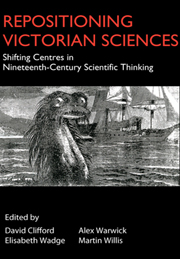Book contents
- Frontmatter
- Contents
- Notes on Contributors
- 1 Margins and Centres
- SECTION I Shifted Centres
- SECTION II Contested Knowledges
- SECTION III Entering The Modern
- 13 Fresnel's Particular Waves: Models of Light as Catalytic Modes of Worldmaking in Early Modern Times
- 14 Re-imagining Heaven: Victorian Lunar Studies and the Anxiety of Loneliness
- ‘You Should Get Your Head Examined’: Freudian Psychoanalysis and the Limits of Nineteenth-Century Science
- 16 Scholars, Scientists and Sexual Inverts: Authority and Sexology in Nineteenth-Century Britain
- 17 Unmasking Immorality: Popular Opposition to Laboratory Science in Late Victorian Britain
- Notes
- Select Bibliography
‘You Should Get Your Head Examined’: Freudian Psychoanalysis and the Limits of Nineteenth-Century Science
from SECTION III - Entering The Modern
Published online by Cambridge University Press: 05 March 2012
- Frontmatter
- Contents
- Notes on Contributors
- 1 Margins and Centres
- SECTION I Shifted Centres
- SECTION II Contested Knowledges
- SECTION III Entering The Modern
- 13 Fresnel's Particular Waves: Models of Light as Catalytic Modes of Worldmaking in Early Modern Times
- 14 Re-imagining Heaven: Victorian Lunar Studies and the Anxiety of Loneliness
- ‘You Should Get Your Head Examined’: Freudian Psychoanalysis and the Limits of Nineteenth-Century Science
- 16 Scholars, Scientists and Sexual Inverts: Authority and Sexology in Nineteenth-Century Britain
- 17 Unmasking Immorality: Popular Opposition to Laboratory Science in Late Victorian Britain
- Notes
- Select Bibliography
Summary
As science turned its focus towards ‘man’, new disciplines emerged with the aim of utilizing scientific methods to understand and regulate human behaviour. Rather than understanding this scientific inquiry into human behaviour as a unique historical phenomenon with an identifiable moment of origin, we must recognize its continuity with a long tradition through which it found momentum yet against which it would struggle for authority. The search for knowledge about human existence and behaviour clearly did not begin with the emergence of science as a discrete discipline in the eighteenth century; instead, through a complex network of intellectual and social reconfigurations, it was incorporated into an emerging disciplinary structure and found legitimization through its relation to science. During this time of change in how knowledge was produced, valued and circulated, a range of new disciplines contended for authority over self-knowledge. To understand how psychoanalysis would eventually come to function within this network of disciplines and ultimately to undermine the concept of science itself, I want to consider briefly how several of them developed and how they come to contribute to Freud's psychoanalytic project.
As philosophy became focused on metaphysical questions explored primarily through philosophical speculation and reason, physiologists continued to use scientific methods to observe and measure bodily responses as a means of establishing the basic foundations for sensory physiology. Despite their attempts to understand all perceptual phenomena in terms of mechanistic bodily operations, however, physiologists were increasingly confronted with a factor that they seemed unable to explain.
- Type
- Chapter
- Information
- Repositioning Victorian SciencesShifting Centres in Nineteenth-Century Thinking, pp. 183 - 196Publisher: Anthem PressPrint publication year: 2006



